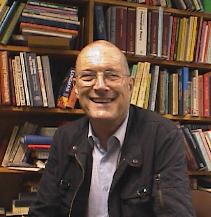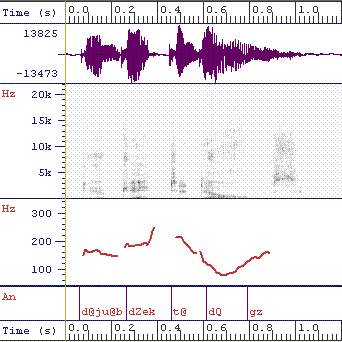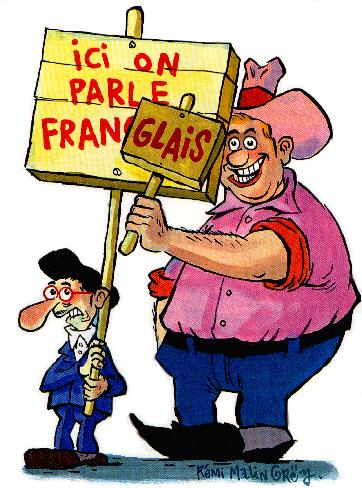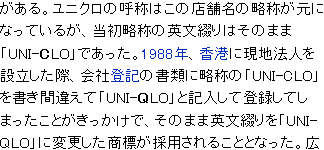DEPARTMENT OF SPEECH, HEARING & PHONETIC SCIENCES UCL Division of Psychology & Language Sciences |
 |
John Wells’s phonetic blog archive September 2007email:
To see the phonetic symbols in the text, please ensure that you have installed a Unicode font that includes all the IPA symbols, for example Lucida Sans Unicode or Charis SIL (click name for free download).
Browsers: I recommend Firefox (free) or, if you prefer, Opera (also free).
|
|
| Friday 28 September 2007 | /What was that?Listen to this sound clip from the CD-ROM that accompanies my book English Intonation. What do you hear the speaker say? Since the publication of the book, several readers have kindly written to draw my attention to various misprints and so on in the text or errors on the CD. I am grateful to them. Sometimes, though, the supposed error is not an error at all. In the sound clip (p. 109 in the book) Michael Ashby is actually saying Do you object to dogs? and that is what I hear if I listen. But my Japanese correspondent heard Do you get to dogs? and listed this for me as an error on the CD. You can see why the misapprehension might arise. The first three syllables of Do you object are spoken very fast. I can still hear (or think I hear) the segments [dəjuəbˈdʒek-]. But I can see how a Japanese listener might miss the second [ə] and the non-audibly released [b], then mishear [dʒ] as [g]. The usual contextual elision of the final [t] of object and the equally usual non-audible release of [k] accounts for the rest of the mishearing. The moral I draw is that EFL leaners do need to know about contextual effects such as weakening, elision, assimilation, and plosive releases. Otherwise they are in danger of failing to understand ordinary spoken English. And this wasn’t even sloppy colloquial speech with accompanying extraneous noise. It was scripted and then read aloud in soundproof studio conditions. From [dəjuəbˈdʒektəˈdɒgz] (the whole thing lasting less than a second) you have to be able to recover Do you object to dogs?.
|
|
| Thursday 27 September 2007 | Yogh bareReacting to John Maidment’s neologism yoghism (blog, 25 Sep.), Eric Armstrong writes about yogh: Wikipedia says that it's "pronounced either [joʊk], [joʊg], [joʊ] or [joʊx]". But their entry makes no mention of the IPA's usage, does it... I have good news for Eric. Ezh and yogh are different letters. And the Unicode name for ʒ is ezh. In Unicode, the symbol ʒ has the number U+0292. This means that to enter it in modern versions of Word you can type 0292, select this string of digits, and do Alt-X. Providing the current font allows, an ezh will appear on your screen. Writing HTML code for a web page you can insert The Unicode number for yogh, on the other hand, is U+021D. It is a fairly recent addition to Unicode, and therefore still missing from many computer fonts, even phonetic ones. For example, it is not included in Lucida Sans Unicode. (This means that you may not see it properly displayed in the sidebar, depending on what fonts you have available.) Yogh is not a phonetic symbol, but a letter used in Middle English and Middle Scots to stand for a velar fricative or palatal approximant. (By the way, I call it /jɒg/.) Norman scribes didn’t like letters not found in the Latin alphabet, so yogh was phased out and replaced by gh. When it was retained, it came to look just like z, which is why we have a spelling-to-sound mismatch in such names as Dalziel /diˈel/ and Menzies /ˈmɪŋɪs/. Ezh has an angled top, whilst yogh has a curly top. John Maidment ought really to have referred to creeping ezhism. The confusion between the two names is found, I am sorry to say, to the Phonetic Symbol Guide by Geoff Pullum and Bill Laduslaw (University of Chicago Press, 19962), where the phonetic symbol is unfortunately labelled YOGH. But the IPA Handbook calls it Ezh or Tailed Z. By the way, Geoff, welcome back to Blighty! | ʒ ȝ |
| Wednesday 26 September 2007 | Rupert?As I read yesterday’s Guardian, I did a double take. It was in the Conference diary, a parliamentary sketch writer’s impressions of the Labour Party conference currently being held in Bournemouth. The writer was talking about a group of former Conservatives who had crossed the floor to support Labour. Despite various others whom the conference might have especially applauded, the conference reserved its enthusiasm for a shameless performance from the Europhile MP, Quentin Davies, as plummy and red-faced an ex-Tory as you could hope to find. However, many in the hall thought the standing ovation for Davies was nauseous. “I never thought I’d belong to a party in which people were called Quentin. What next, Rupert?” whispered one. (I must explain for the non-Brits that Quentin and Rupert are stereotypically perceived as names found only among members of the upper class: certainly not working-class names such as one would traditionally expect to find among members of the Labour Party.) Anyhow, at first I interpreted Rupert as a vocative: 'What \next, Rupert? But that didn’t make sense, and I realized that the correct reading must be to interpret Rupert as “Is there next going to be someone called Rupert?”. That is, the intended intonation was 'What \next, | /Rupert? Clearly, when reading silently, I do subconsciously select appropriate intonation patterns as I go. Here I had at first selected the wrong one. All would have been clear if the sketch writer had punctuated differently: “What next? Rupert?” whispered one. |
|
| Tuesday 25 September 2007 | Predating /ʒ/ in liegeThat’s predating in the OED Newsletter sense, finding or constituting an earlier attestation of, /ˌpriːˈdeɪtɪŋ/, not in the ecological sense of regularly preying on, /priˈdeɪtɪŋ/. Obviously (blog, 20 Sept.) I should have checked in Jack Windsor Lewis’s Concise Pronouncing Dictionary, published by OUP in 1972. There it is: liːʒ as the second choice for liege. And CPD gives very few second choices. Anyhow, CPD clearly predates LDP by twenty years. Jack’s own blog has more thoughts on the subject. Meanwhile Kensuke Nanjo writes to point out that Webster’s Third New International Unabridged (1961) gives this variant in the second place with the label “sometimes”. I’ve checked, and he’s quite right. But I was right in saying that it’s not in the more widely used Webster’s Collegiate. So Merriam-Webster was there even before ODP, and long before LPD. P.S.Er... the OED Newsletter term is actually antedate, not predate. In a related email, John Maidment says What annoys me slightly is the pronunciation of Beijing with /ʒ/ instead of /dʒ/. This creeping yoghism should be stamped out. (His neologism refers to yogh, not to yoga.) To which one might add: the same applies to raj, Taj Mahal, adagio and several others. |
ȝ Yogh (missing in many fonts) |
| Monday 24 September 2007 | Bad sociophoneticsHere is an email I received recently. “Dear Sir, my name is XXX and I am the bureau chief here in London for [...] Australia publications [...]. — to which I replied, “You really mustn’t believe everything you read in the papers. The Australian accent is not "well and truly creeping into the everyday [sic] of Britons". I feel like Ben Goldacre with his Bad Science column in the Guardian. “The archives at badscience.net are overflowing with just a small sample of the media’s crimes: preposterous cherry-picking, outrageous overextrapolation, startling ignorance or whitewashing of known methodological flaws and, worst of all, reporting the authors’ speculative conclusions, from the discussion section of a paper, as if they were the experimental results themselves.” |
|




















